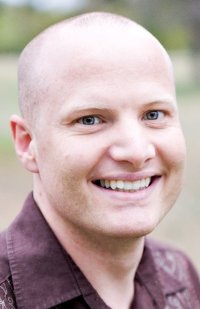During Stalin's rule of the Soviet Union in the 1950s, Nikita Khruschchev was the leader of the Communist Party.
After Stalin's death,
Khrushchev visited the United States and gave a press conference.
He was given a written question from a reporter, "Today you talked about
the hideous rule of your predecessor, Stalin. You were one of his
closest aides and colleagues during those years. What were you doing all
that time?"
Khrushchev glared at the audience, his face reddening in anger. "Who asked that?" he roared.
Silence from the audience.
Once again he bellowed, "Who asked that?"
Dead silence.
After a long pause, Khrushchev said quietly, "That's what I was doing."
I scratch my head and wonder about the reporter who was bold enough to ask the question, but too afraid to stand up and own it.
A few years earlier, a Protestant pastor in Germany named Martin Niemöller was released from a Nazi concentration camp after seven years of imprisonment and wrote,
First they came for the Socialists, and I did not speak out
Because I was not a Socialist.
Then they came for the Trade Unionists, and I did not speak out
Because I was not a Trade Unionist.
Then they came for the Jews, and I did not speak out
Because I was not a Jew.
Then they came for me -- and there was no one left to speak for me.
"All that is necessary for the triumph of evil," wrote Edmund Burke, "is that good men do nothing."
"The world is a
dangerous place," said Albert Einstein, "not because of those who do
evil, but because of those who look on and do nothing."
I hope to live worthy of the phrase I want chiseled into my gravestone: "He stood steadfastly against the tide."
A former member of the Nazi party, Landmesser came to oppose Hitler's regime after fathering children with a Jewish woman.
A picture snapped in 1936 at a crowd in Hamburg, Germany shows his brave rejection of the Nazi doctrine:
Landmesser was found
guilty of "dishonouring the race" under Nazi law. He and his wife, Irma
Eckler, were jailed by the Gestapo, their children separated and sent to
an orphanage.
August was freed from prison in 1941 but was soon drafted into the war.
He was later declared missing in action and was presumed dead. But
because he stood and was counted among the dissenters, he has not gone missing from the pages of history.
Martin Luther King, Jr. wrote,
"The ultimate measure of a man
is not where he stands in moments of comfort and convenience, but where
he stands at times of challenge and controversy."
A picture hanging in my office shows the anonymous rebel in Beijing's Tiananmen Square standing up to a line of tanks on June 5, 1989, protesting China's communist rule:
People like August Landmesser and the unknown Tank Man provide inspiring examples to emulate.
Yet defying tyranny, standing steadfastly against the tide in our day is done by much simpler, less public actions.
We stand up and are counted
when we turn off the TV and pick up a good book instead. When we choose
to not click that racy link. When we stop buying the plastic, processed
junk sold as "food" and the pills peddled to mask the symptoms of the
diseases caused by the junk we eat. When we reject the flimsy argument
that we're "throwing away our vote" and vote on conscience and
principle. When we conquer fear and start a business. When we toss
credit card offers in the trash.
There may come a day
when our grandchildren ask us about the debt, taxation, pollution,
widespread obesity and disease, and other problems they'll undoubtedly
be burdened with.
"You saw it all happening," they'll say. "What were you doing all that time?"
I hope our response is not silence.
Share this newsletter:
**************************
 Stephen Palmer is a writer and entrepreneur devoted to helping people conquer limitations, maximize their potential, and achieve true freedom.
Stephen Palmer is a writer and entrepreneur devoted to helping people conquer limitations, maximize their potential, and achieve true freedom.
Stephen and his wife are raising their four children in southern Utah.
 Social Leader Weekly
Social Leader Weekly  Social Leader Weekly
Social Leader Weekly